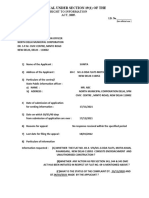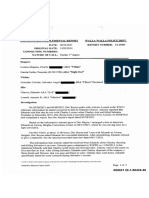Personal Vs Professional Values
Personal Vs Professional Values
Uploaded by
neethuckCopyright:
Available Formats
Personal Vs Professional Values
Personal Vs Professional Values
Uploaded by
neethuckOriginal Title
Copyright
Available Formats
Share this document
Did you find this document useful?
Is this content inappropriate?
Copyright:
Available Formats
Personal Vs Professional Values
Personal Vs Professional Values
Uploaded by
neethuckCopyright:
Available Formats
Dissonance Between Personal and Professional Values: Resolution of an Ethical Dilemma
Erin B. Comartin, LMSW at9766@wayne.edu A. Antonio Gonzlez-Prendes, Ph.D. Wayne State University Detroit, Michigan Journal of Social Work Values and Ethics, Volume 8, Number 2 (2011) Copyright 2011, White Hat Communications This text may be freely shared among individuals, but it may not be republished in any medium without express written consent from the authors and advance notification of White Hat Communications. Acknowledgements: The authors would like to thank the Elizabeth N. Brehler Scholars Program for the personal and professional growth that evolved during the development and writing of this paper.
Abstract
Conflicts between personal and professional values are common in social work practice. This article highlights a personal narrative of a social workers journey to resolve one such ethical dilemma. The author describes the process of personal reflection and confrontation of long-standing beliefs and the implications for social work practice. Key Words: ethical dilemma, social work values, dignity and worth of the person, feminism, dilemma resolution.
1.
Introduction
Often, in the course of practice, social workers encounter situations that bring them face to face with a conflict between their personal values and the values of the profession. The National Association of Social Workers Code of Ethics (NASW, 1999) has identified six core values and ethical principles that guide social workers
professional behaviors. These core values and their ethical principles are: Service. Social workers primary goal is to help people in need and to address social problems. Social justice. Social workers challenge social injustice. Dignity and worth of the person. Social workers respect the inherent dignity and worth of the person. Importance of human relationships. Social workers recognize the central importance of human relationships. Integrity. Social workers behave in a trustworthy manner. Competence. Social workers practice within their area of competence and develop and enhance their professional expertise. These values and principles compel the social worker to commit to practice in a manner that safeguards the clients rights to privacy and self-determination and to be treated with dignity and respect. These
principles do not differentiate between types of clients or client behaviors that are deemed worthy of ethical consideration. The social worker, who practices and lives the ethical standards of the profession, is compelled to apply these principles to practice with all clients. This process is facilitated when there is congruence between the workers personal and professional values. Cormier, Nurius and Osborn (2009) argue that when personal values of helpers are consistent with professional standards of conduct, helpers are more likely to interact genuinely and credibly with clients and other professionals (p. 32). What happens when the social worker faces a situation where there is a clash of competing values, such as personal values and professional ones? Ideally one would prefer that there be a high level of congruence between the two. Nonetheless, the reality often is that we bring into our practice our own personal core values, beliefs and biases, shaped through our life experiences. We ascribe a high level of importance to our personal values and life experiences that may, at times, create dissonance with our social work values. The NASW Code of Ethics (1999) guides social workers to respect the intrinsic dignity and worth of clients and to treat each person in a caring and respectful manner. Translated into practice, this principle means that social workers must respect the intrinsic worth and dignity of their clients and demonstrate unconditional acceptance of their clients personhood. Thus, they should avoid judgmental attitudes that may frame the client with pejorative or dehumanizing labels. However, there are times in the course of practice when we are faced with clients whose behaviors and attitudes collide with our personal values. In such cases, what actions do we take to help us
differentiate between the wrongness of a persons actions and the worth of the individual? How do we avoid passing judgment on an individual whose behavior is unacceptable at best and heinous at worst? If we aspire to respect the intrinsic worth and dignity of all clients, how do we then judge a behavior as good or bad without using that behavior to frame the entire worth of an individual? As Zastrow and Kirst-Ashman (2007) indicate, social workers at various levels of professional development and throughout their careers must face situations in which there may be no perfect solution for the clash of conflicting ethical principles. In such cases it is important that we learn to work through the conflict in a manner that is congruent with the values and ethics of our profession. However, as Doyle, Miller, and Mirza (2009) suggest, a code of ethics does not prescribe specific actions for ethical decision-making. The purpose of this article is to describe a case of dissonance between personal feminist values and social work values that compelled a social worker (EC) to confront an ethical dilemma, and prompted a process of resolution through critical thinking, personal exploration, reflection, self-discovery and supervision. Although effective models of ethical decision-making provide a framework to help social workers resolve ethical dilemmas (Cormier et al., 2009; Mattison, 2000), there is a paucity of literature, perhaps due to the complex nature of this issue, which has addressed the specific process and factors that influence a social workers decisionmaking method (Doyle et al., 2009). Therefore, this article uses a personal narrative to illuminate those overarching factors that contributed to a conflict between personal and professional values, and the resolution of the conflict. The outcome of
Journal of Social Work Values & Ethics, Fall 2011, Vol. 8, No. 2 Page 5-2
this process was an increased awareness of biases and judgmental attitudes that might otherwise have gone undiscovered. This course of action was critical in allowing this social worker to grow and develop personally and professionally and become a more effective helper.
2.
Feminist Theory
As will be shown throughout the narrative, this journey begins with a personal history that valued feminism and flourished with the authors practice with victims of domestic violence and sexual assault. Feminist values have fundamentally shaped both my self and my world views. Thus a discussion of this underpinning perspective in general, and specifically related to domestic and sexual violence, is necessary. On a societal level, the foundation of feminist theory suggests that multiple forces exist that place women in a subordinate position to men. Women are viewed as physically, intellectually, emotionally and sexually less capable than their male counterparts (Crawley, Foley & Shehan, 2008; Ruth, 1998). While there are multiple perspectives within feminist theory (Saulnier, 1996), this basic premise guides the thoughts and behavior of each gender. From this ideology it follows that a feminist is one who questions and challenges the belief that men are more capable than women, and thus, values gender equality. In the field of domestic violence and sexual assault, practice frameworks and models stem from a feminist perspective (McPhail, Busch, Kulkarni & Rice, 2007). Feminist theory in this field suggests that physical and sexual violence tactics are used to control women and to maintain the power differential that exists between men and women. As Brownmiller (1975) suggests,
one such tactic is rape. Moreover, Dworkin (1989) notes that womens fear of violence overrides a basic freedom that is afforded to menfreedom of movement. She goes on to argue that we must recognize that freedom of movement is a precondition for freedom of anything else. It comes before freedom of speech in importance because without it freedom of speech cannot in fact exist. (Dworkin, 1989, p.16). Consequently, the fear of rape is a tactic that limits womens freedom. The intrinsic injustice of this tactic, together with the authors (EC) work with rape survivors, contributed to a personal belief that those who subjugated and perpetrated sexual violence against women were less worthy and deserving human beings; a belief that engendered intense levels of anger towards these offenders. This view would be at the center of the ethical dilemma the author was about to face.
3.
Practice Dilemma
My first field placement during my Masters of Social Work (MSW) education appeared to have all the qualities of a perfect position. It had everything I was looking for: a focus on human rights, along with opportunities to learn about program development, policy and community organizing. I moved through my first project with ease and felt competent in the application of what I had learned. When it came time to determine my second project, my enthusiasm turned into ambivalence, which stemmed from the realization that I was being confronted by a serious conflict between my personal and professional values. This conflict occurred during a meeting with my MSW field instructor, the identified individual who links the course content to field application; and the Policy
Journal of Social Work Values & Ethics, Fall 2011, Vol. 8, No. 2 Page 5-3
Director, the person who would oversee my tasks on a project related to policy and community organizing. The conversation started with a discussion about my previous experience and what I wanted to gain through the new placement. I expressed a strong desire to be assigned a project that was related to womens issues, during the implementation of which I would gain policy skills. The Policy Director said, Well, nothing is really going on at the state level with any womens issues right now, but there is a policy project working with mothers. How does that sound? From this brief description, it sounded as if it were related to womens issues. I wondered to myself, If I am going to be working with mothers, the people in society who have experienced what our culture terms the defining moment of womanhood, how could it not be a womens issue? She described the project as one in which I would be working in the state capital with a group of mothers whose sons had been placed on the public sex offender registry. This group was advocating for legislative changes to the states policy governing the required registration of sex offenders. Immediately, I understood the complexity of the moment. I was drawn to the project for the opportunity to be involved with state policy initiatives and work on behalf of women (i.e. mothers); however, I realized that in working with sex offenders, some of my deeply held personal values and beliefs might come into conflict. Although it was not clear to me then, soon I realized that my hesitancy to engage in this task stemmed from the discord between my personal feminist values and social work values. On the one hand, I strongly believe in a womans right to equality and to live free of fear and oppression, and, on the other hand, I adhere to professional social work value of respect for the dignity and worth of
all persons. This involves the provision of services to people in need, while elevating service to others above self-interest (NASW, 1999). However, in this situation I was being called to advocate on behalf of those whom I judged to be the ultimate perpetrators of fear and oppression upon women: sex offenders. Although I did not know it at the time, this clash of values would force me to confront personal beliefs and would send me on a path of discovery, growth and self-awareness, and ultimately, resolution of the dilemma. According to Banks (2001; 2006), ethical dilemmas in social work practice occur when the social worker is faced with having to choose between two equally unwelcomed alternatives which may involve a conflict of moral principles and it is not clear which choice will be the right one (p. 11). According to Banks, a defining characteristic of an ethical dilemma is that there may seem to be no solution. This contrasts with Banks view of an ethical problem, where the social worker, although facing a difficult decision, seems to have a clear notion of the decision to be made. Banks (2001) suggests that ethical dilemmas in social work practice generally revolve around three main issues: (1) individual rights and welfare, (2) public welfare, and (3) inequality and structural oppression. It was this third type of issue, inequality and structural oppression that would ultimately underscore the case that I was facing. However, two other key social work values and principles clearly resonated in my consciousness, these were: the value of service that guides social workers to help people in need and elevate social-interest above self-interest, and the value of respecting the inherent worth and dignity of every person (NASW, 1999). As I contemplated the alternatives I became
Journal of Social Work Values & Ethics, Fall 2011, Vol. 8, No. 2 Page 5-4
increasingly aware that this assignment also included elements of social justice and social change on behalf of oppressed individuals or groups. Banks (2001) further proposes that as part of this issue it is the social workers responsibility to strive to change policy that supports such oppression. Based on Banks definition of ethical dilemma I found myself facing what I thought to be two unwelcomed alternatives. The first alternative entailed accepting the task of working with the sex offenders, which would betray my feminist principles of promoting equality for women and the right to live free of fear and oppression. The second alternative was to refuse to work with this population. Yet, by engaging in such refusal I believed I would be betraying the social work values of service, respect for the inherent worth and dignity of individuals, and challenging social injustice and oppression. Although a code of ethics may provide guidance around expectations for ethical conduct and individual responsibility, it does not provide clear steps for the resolution of ethical conflicts or dilemmas. Several ethical decision-making models have been formulated to help social work practitioners facing ethical dilemmas (see Cormier, Nurius, & Osborn, 2009; Mattison, 2000). A summary of the key elements of these models that were particularly helpful working through this case included: (1) organizing background information and details to clearly describe the issue at hand, (2) considering the ethical principles that bear on the case and separating those from my own personal values or other professional standards, (3) examining conflicts and tensions, both internally and externally, that I experienced throughout the process, (4) identifying possible alternatives and reflecting on the
consequences and projected outcomes of such, (5) selecting and implementing the preferred choice of action, and (6) finally, assessing the outcome and possible implications of the resolution. Since the process of ethical decisionmaking is generally laden with tension, conflict, and some level of abstraction it is suggested that social workers, particularly those at the beginning stages of their career, seek consultation and supervision that will help them work through the steps delineated above. In this case supervision was particularly helpful along two lines. First, it helped to navigate the ethical decisionmaking process, with particular focus on consideration of the ethical principles involved, recognition of tensions created by the dilemma between personal and professional values, and the ultimate resolution of the conflict. Second, supervision provided an opportunity to examine, and begin the process of reframing, long-standing judgmental and biased attitudes and perspectives that underscored my reluctance to work with sex offenders.
4.
A Journey to My Past
It has been suggested that out of our early childhood experiences we begin to form the core beliefs and values that influence the way we judge ourselves, others and the world-at-large (J. Beck, 1995). As I reflected on my past, it was during the early latency phase of my childhood that I began to recognize a difference in the way men and womens social roles were defined in my family. As the only girl with three older brothers, it became apparent to me at a young age that I was not allowed to do what the boys did. My family held traditional roles for women; roles that led
Journal of Social Work Values & Ethics, Fall 2011, Vol. 8, No. 2 Page 5-5
most women in my family to set goals only related to domesticity. Women were expected to marry and have children, and there was a clear expectation that they would remain in the home to raise their children. This attitude restricted the freedom of movement for the women in my family and left little room for a career or individual goals outside of the home. Along with the traditional roles came the stereotypical beliefs that women were the weaker of the sexes and men were expected to be the decision-makers for their families. The implicit and explicit messages that I received underscored the view that women were limited in their capacity to achieve and succeed beyond their domesticity; they were judged based on their gender, not for their abilities. As I became more cognizant of the status of women in my family, I developed an overwhelming sense of frustration and anger. Throughout my adolescent and teenage years, this anger intensified as I immersed myself in feminist readings. I felt a strong sense of injustice and inequality about the limited options available to me, to all the women before me, and to all the young girls coming into my family after me. My anger, fueled by a sense of injustice, is what led me to the profession of social work: I wanted to make changes in the quality of life for girls and women. Mueller and Leidig (1976) note that, throughout the womens movement, the expression of anger was prevalent and used as a motivator for prosocial change to help overcome womens sense of powerlessness (see also Cox, et al., 2004). Consciousness-raising groups excavated the sources of womens anger, which included: womens reliance on men for economic stability; womens experiences of objectification and social put-downs, which judged women based solely on their
gender; and the physical disparity that exists between the sexes, making women fear for their physical and sexual safety. Gradually, I began to realize that the targets of my anger were those policies or entities that systematically placed women in positions of powerlessness, which contributed to unjust treatment and further fueled womens abuse and fear. In my mind, sex offenders personified this notion. My experiences in the field at two domestic violence and sexual assault shelters reinforced the sources of my anger. The women I served lived in constant fear of their perpetrators. Stories of severe abuse solidified my beliefs that men who abuse and objectify women represented societys subjugation of women by men. These men emotionally, physically and sexually control women. The stories I heard greatly impacted my beliefs regarding offenders and perpetrators of violence against women. I directed my anger towards these men, and at the extreme end of my reproach were sex offenders. To me, they encompassed all of these control tactics. I blamed sex offenders for the fear that I, and most women, live under. My dislike for this group carried into my MSW field education placement questionnaire, where I noted that I would not take a placement working with sex offenders. At the time, based on the views that I had internalized from my experience with domestic violence and sexual assault survivors, I felt it was appropriate for me to withdraw from any professional contact with a group of people I felt I could not serve adequately. In essence, I did not want to provide services to this population. So, do you want to work on this project? the Policy Director asked. At the time, my intuition told me to turn it down; however, I knew it would be critical for my career to have the policy experience the
Journal of Social Work Values & Ethics, Fall 2011, Vol. 8, No. 2 Page 5-6
assignment would offer. In the end, I pushed my poignancy and disappointment aside and accepted the project. Immediately I began to experience the internal conflict that arises between contending values. Glassman (1992) suggests that feminist social workers experience conflicts between their personal values as feminists and the ethics and values of the social work profession. For example, social work values encourage the practitioner to consider and respect the cultural milieu and context of the clients world. However, when that cultural context involves an unfair, patriarchal system, a feminist worker may have to defy that value by encouraging the client to evaluate and challenge the oppressive nature of such a system. Glassman (1992) advocates for selfreflection and dialogue to resolve the conflicts that arise between feminist and professional values. On one hand, I strongly believed in the feminist value of upholding a womans right to live without the fear of abuse or assault. On the other hand, I also felt a sense of commitment to the social work values of providing help to those in need and raising service to others above self-interest, as well as upholding the inherent dignity and worth of every human being. I later realized that, as it often is with ethical dilemmas, this conflict was only one aspect of a more complex situation. During the first meeting about this project, the women in the group shared their sons stories, including the events that caused them to be on the registry, their court cases and their experiences as publiclyregistered sex offenders. These young men would be placed on the registry for 25 years, or life, following their convictions for crimes that, although not excusable, involved a mistake they made prior to adulthood. These mothers felt that the punishment was too severe for the offense
committed. As I reflected on the inequity the women expressed, I experienced a similar feeling of anger as I felt in my past, but this time it was ignited by the stories of injustice these families were relating. What impacted me most was the multitude of stigmatizing experiences these young offenders had faced. Many of them had been called names such as monster or predator; furthermore, they had been shunned by some of their peers and the community. As the women told these stories, I reflected on times when I had mentally labeled perpetrators and offenders with similar names, not having fully realized the pain that these dehumanizing words were now causing for these young men and their families. The descriptive terms I had used to dehumanize sex offenders appeared to stem from the anger I felt growing up, which was rooted in my view of how women were perceived within my family and by society at large. Anger, as described by Fitzgibbons (1986) is, a strong feeling of displeasure and antagonism aroused by a sense of injury or wrong (p. 629), and is a general human response when an individuals needs go unmet. When my family set limitations around goals I wanted to set for my life, I believed that they were denying me my right to be treated equitably. A. Beck (1999) furthers the discussion on anger by noting that, when one feels angry, one establishes a cognitive us versus them dichotomy in order to blame someone for the wrongdoing. Upon further introspection, I began to realize that sex offenders were the ultimate offenders against women: the enemy. By using stigmatizing and pejorative labels, whether consciously or unconsciously, I blamed and framed them in derogatory terms. Once the label had been placed, I began to perceive these individuals as inherently bad and I
Journal of Social Work Values & Ethics, Fall 2011, Vol. 8, No. 2 Page 5-7
judged them only by their criminal actions (Meier & Robinson, 2004). In retrospect, I realize that I had stripped them of any inherent worth or dignity. A. Beck (1999) suggests that, the more extreme the undesirable derogatory adjectives, the less human the out-grouper appears and the easier it is to aggress against him or her with impunity (p.154). I consciously labeled sex offenders and held them in the category of undesirable human beings. They became an object of my hostility. Now, as I was faced with the task of advocating on behalf of individuals who had committed sexual offenses against women, I would need to overcome my anger and hostility, and confront the derogatory views with which I framed the total personhood of these individuals. I also recognized that I would need to work to engender a more balanced and realistic perspective of these individuals. In my field placement, I found myself challenging old beliefs about sex offenders. Although not condoning their behavior or offense, and maintaining a strong sense of empathy for their victims, I worked to adopt a wider perspective that would allow me to appreciate the individual human worth of each person and, in some cases, understand their own history of victimization. My experiences at the domestic violence and sexual assault shelters provided a perspective on the issue that spoke to my personal experiences of being a woman and the fear in which I lived. My experience at this placement showed me the offender side of the issue, which spoke to my passion to eradicate social injustices and provided me the opportunity to do an indepth evaluation and reframing of the narrow and disparaging views I held towards sex offenders. At this moment in time I was facing an ethical dilemma fueled by the conflict between the social work value of
upholding the dignity and worth of the person and my personal beliefs. I wrestled with the question of whether a feminist social worker could advocate on behalf of sex offenders. The conflict between my feminist and social work values hinged upon my inability to separate the intrinsic value of the individual from his or her behaviors. I was unable to see that, regardless of the specific behavior, (i.e. sex offenses that were committed) there is always a person that has the same dignity and worth as everyone else. I realized that, similar to the survivors that they have victimized, perpetrators of sexual offenses have often been subjected to harmful and hurtful experiences. Although the rates vary, a number of studies have reported that individuals who exhibit a history of sexual offenses show higher prevalence rates than non-offender populations of having been sexually abused as children (Dhawan & Marshall, 1996; Romano & De Luca, 1997; Seghorn, Boucher, & Prentky, 1987; Weeks & Widom, 1998) Following their study of 147 sex offenders, Coxe and Holmes (2001) also indicated that, although the factors that impact the dynamics of being both a victim as well as an offender are complicated, and no direct cause-effect can be inferred, there is the suggestion of a relationship between early history of being sexually abused as a child and later sexual perpetration as an adult. Severson (1994) writes that practitioners who work with offenders must have a different perception of these clients: It demands a rethinking of the concept of victim (p. 452), and even further, that all individuals, regardless of their behaviors, are worthy of the professions skills and knowledge in improving their social functioning and quality of life.
Journal of Social Work Values & Ethics, Fall 2011, Vol. 8, No. 2 Page 5-8
Human rights-based approaches to the treatment of sex offenders are founded on a core value that respects the dignity of all human beings (Connolly & Ward, 2008; Ward & Connolly, 2008). This value suggests that freedom and well-being of offenders, their victims, and the community are equally important for healthy communities. The Good Lives Model (Ward & Stewart, 2003) and the Offender Practice Framework (Ward & Connolly, 2008) are grounded in human rights philosophy and seek to ensure that offenders can identify and acquire the skills necessary to live a life that is meaningful to them, while at the same time respects the needs and rights of others. These models guide social work practitioners in the process of treatment and rehabilitation. During assessment and treatment, social workers must be cognizant that offenders are rights-holders, meaning that they deserve the same level of dignity and service as any other client. With this right, social workers must also realize that offenders are duty-bearers, meaning that they must respect and appreciate the needs and rights of others (Connolly & Ward, 2008). While human rights perspectives have informed practice within the prison system, there has been little attention to human rights with regards to community reintegration and the freedom and well being of offenders upon their release from prison (Connolly & Ward, 2008). The goal of community reintegration is to afford offenders the right to redeem their criminal behaviors with a belief that they have the capacity to change. However, current policies such as sex offender registration appear to place more weight on the rights of the community, and deprive the offender of the opportunity for change. Ward & Connolly (2008) suggest that this
deprivation of human rights will result in the offender being unable to respect the rights of others. Offenders will resent the lack of dignity exhibited towards them, which decreases their ability to reintegrate into the community and increases the chances for reoffense. Under a human-rights perspective, social workers must focus on the freedom and well-being of offenders throughout the assessment and treatment phases with sex offenders. Human rights can be ensured by focusing on respectful interactions with the offender, using the ethics of the profession to include them in the treatment process, and allowing for self-determination where possible (Connolly & Ward, 2008). Taking a constructive, humanistic approach to work with sex offenders is required for respecting their dignity, and allowing for freedom and well-being for a meaningful life, and successful community reintegration.
5.
A New Self-Awareness
My upbringing and field placement revealed to me the limitations that we place on ourselves and others when judgments are made based on narrow and simplistic perspectives of individuals. Now, through the process of self-reflection, I recognized that I had become judgmental. I internalized the judgmental behavior that I had experienced within my family, which placed limitations upon me, and I used that experience to blame and dehumanize those who, in my view, perpetrated oppression upon women. Through this process of selfawareness, I recognized that if I were to engage in the ethical practice of social work, I would have to bring about a fundamental change in some of my beliefs and values. I needed to find a resolution to the dilemma presented by these contending values and
Journal of Social Work Values & Ethics, Fall 2011, Vol. 8, No. 2 Page 5-9
also to find ways to express my anger in healthier and more pro-social ways. Ultimately, my field placement experience forced me to confront my biases and prejudices and to become more congruent with social work values. Moreover, since I had also become judgmental of my family, I worked to rationally reframe those long-standing beliefs. I realized that my family did not intend to damage or limit me personally by imposing traditional gender roles upon me. They were simply reliving and recreating generational scenarios and rules that informed them as to how men and women should be and what paths in lives they should pursue. I learned that they had replicated historical societal structures that perpetuated mens domination of women that shaped their perceptions of the role of women. As hurtful and limiting as these perspectives were, I was able to recognize that my family meant no harm. I also learned that anger can be used prosocially to overcome and advocate for change, such as it has in the womens movement or how it has motivated service on behalf of those who suffer injustice (Ellis & Tafrate, 1997; Glassman, 1992). As Dolgoff, Loewenberg, and Harrigton (2005) suggest, ethical decisionmaking is not a prescriptive endeavor, but rather often involves a complex process of reflection on multiple factors impinging upon the situation. In this case the process involved identifying and reframing deeply held personal beliefs and values that clashed with my professional values. I recognized that some of my views and beliefs towards sex offenders were narrow and pejorative. However, I also realized that my feminist values of advocating for womens equality and their right to live free of fear did not preclude me from advocating against
injustice and unfairness. Through a process that involved self-reflection, professional guidance and supervision, I was able to confront and resolve the dilemma between my personal and professional values in a manner that allowed me to evolve into a more competent and ethical social worker, and also to resolve longstanding feelings of anger. When facing ethical dilemmas, social workers are encouraged to consult with colleagues, supervisors, and the professional organization as they may be of help in the process of ethical decisionmaking and resolution of the conflict (Cormier et al., 2009; Landau, 1999; Mattison, 2000). Gray (2007) suggests that ethical decision-making is a process that revolves around critical thinking, whereby supervisees learn to integrate their knowledge and experience and apply it to their practice. In this process the role of a supervisor is to challenge and encourage supervisees to critically reflect on the dilemma at hand by identifying conflicting values, understanding the ethical issues present, recognizing the moral implications of their action, acknowledging their responsibility in making ethical choices, and identifying and selecting a course of action (Christie, 2009). Often throughout this process the supervisee becomes aware of, and engages in, an examination of important beliefs outside the realm of immediate awareness. In the case presented, supervision was an integral part of working through the ethical-decision making process. Furthermore, as a result of the critical analysis and self-reflection that such a process demanded, it led me to confront and reframe long-standing biases I held towards sex offenders. That process, in turn, sent me through a journey to revisit past experiences
Journal of Social Work Values & Ethics, Fall 2011, Vol. 8, No. 2 Page 5-10
and uncover deeply held beliefs and attitudes that were the root of my anger. Furthermore, reading the literature regarding anger, and consequently writing about the topic, helped me navigate through this ethical dilemma and emerge with a more open perspective.
6. Conclusions and Practice Implications
What started as a critical moment in a social work internship led to a greater appreciation for the ethics and values of the profession. Through the guidance and support offered through supervision and professional development, which included a process of self-reflection and critical thinking, the eventual resolution of this ethical dilemma evolved. The implications of this journey emphasize the role of selfawareness and the need for social workers to be cognizant of their personal values, and how these values may conflict with those of the profession. Therefore, social work education, whether provided through formal courses or continuing education, should stress the ongoing development of selfawareness and the recognition of our own biases. Furthermore, social workers benefit from understanding that growth occurs when these conflicts are acknowledged, explored, and resolved. When conflict between competing values arises, personal core beliefs may highlight biases and prejudice attitudes that underlie the dilemma. Ultimately, social workers must be aware that, if these conflicts go unresolved, their practice with clients will be affected. Most importantly, the profession has mechanisms in place that are designed to guide its practitioners in their exploration and resolution of these conflicts. A number of decision-making models are available that
provide social workers with a framework to guide them in the resolution of ethical conflicts (Cormier et al., 2009; Kenyon, 1999; Mattison, 2000). Furthermore, social workers at all stages of professional development (but more so for those in the beginning stages of their career) should have a solid support network consisting of supervision and colleagues to help them navigate through situations in which they may face ethical conflicts. To the extent possible, social workers should use these mechanisms to explore and resolve conflicts between their personal and professional selves. Drawing from their research with social workers in the field of domestic violence and sexual assault, McPhail, et. al. (2007) suggest a diversion from an entirely feminist model for practice, Feminist practitioners no longer have to feel conflicted, disloyal, or constricted by the feminist model as it embraces a more complex understanding of violence without sacrificing the vital importance of a gendered analysis of power, control, and violence (p. 839). Among many recommendations for changes to the standard feminist model, these authors recommend that feminist practitioners can use feminist theories and models as the foundation of their work, while at the same time using additional theories and models to explain, assess, and intervene in domesticviolence and sexual assault situations. As is reinforced by this exploration of the authors ethical dilemma, McPhail et al. (2007) note that an ideological shift is critical when adapting these new theories and models; the identity of the perpetrator is no longer the focus; the behavior that creates and maintains such violence is. To this social worker, that knowledge was critical in resolving the dilemma between competing
Journal of Social Work Values & Ethics, Fall 2011, Vol. 8, No. 2 Page 5-11
personal and professional values and moving beyond such conflict into a more genuine form of ethical practice.
References
Banks, S. J. (2001). Ethics and Social Work Values (2nd ed.). Houndmills, Basingstoke, Hampshire, United Kingdom: Palgrave McMillan. Banks, S. J. (2006). Ethics and values in Social Work (3rd ed.). New York: Palgrave McMillan. Beck, J. (1995). Cognitive therapy: Basics and beyond. New York: Guilford Press. Beck, A. (1999). Prisoners of hate: The cognitive basis of anger, hostility, and violence. New York, NY: Harper Collins Publishers. Brownmiller, S. (1975). Against our will: Men, women, and rape. New York, NY: Bantam Books. Christie, A. (2009). Workplace abuse: Role of supervisor and supervisee. Journal of Social Work Values and Ethics, 6 (1). Retrieved August 10, 2010 from http://www.socialworker.com/ jswve/content/view/114/67/. Connolly, M. & Ward, T. (2008). Morals, Rights, and Practice in the Human Services: Effective and Fair Decision-Making in Health, Social Care and Criminal Justice. London, UK: Jessica Kingsley Publishers.
Cormier, S., Nurius, P. S., & Osborn, C. J. (2009). Interviewing and change strategies for helpers: Fundamental skills and cognitive-behavioral interventions (6th ed.). Belmont, CA: Brooks/Cole. Cox, D., Van Velsor, P, Hulgus, J., Weatherman, S., Smenner, M, Dickens, D., & Davis, C. (2004). Whats the use in getting mad? Anger and instrumentality in womens relationships. Health Care for Women International, 25(9), 813834. Coxe, R., & Holmes, W. (2001). A study of the cycle of abuse among child molesters. Journal of Child Sexual Abuse, 10(4), 111 -118. Crawley, S., Foley, L., & Shehan, C. (2008). Gendering bodies: The gendered lens series. Lanham, MD: Rowman & Littlefield Publishers, Inc. Dhawan, S., & Marshall, W. L. (1996). Sexual abuse histories of sexual offenders. Sexual Abuse: A Journal of Research and Treatment, 8(1), 7 15. Dolgoff, R., Loewenberg, F. M., & Harrington, D. (2005). Ethical decisions for social work practice (7th ed.). Belmont, CA: Brooks/Cole. Doyle, O. Z., Miller, S. E., & Mirza, F. Y. (2009). Ethical Decision-Making in Social Work: Exploring Personal and Professional Values. Journal of Social Work Values and Ethics, 6, (1). Retrieved on July 25, 2010 from
Journal of Social Work Values & Ethics, Fall 2011, Vol. 8, No. 2 Page 5-12
http://www.socialworker.com/ jswve/content/view/113/67/. Dworkin, A. (1989). Letters from a war zone: Writings 1976-1989. New York, NY: E.P. Dutton. Ellis, A., & Tafrate, R.C. (1997). How to control your anger before it controls you. Secaucus, NJ: Carol Publishing Group. Fitzgibbons, R. (1986). The cognitive and emotive uses of forgiveness in the treatment of anger. Psychotherapy: Theory, Research, Practice, Training, 23(4), 629-633. Glassman, C. (1992). Feminist dilemmas in practice. Affilia, 7(2), 160-166. Gray, M. (2007). There are no answers only choices: Teaching ethical decisionmaking in social work. Australian Social Work, 60 (2), 222-238. Kenyon, P. (1999). What would you do? An ethical case workbook for human service professionals. Pacific Grove, CA: Brooks/Cole. Landau, R. (1999). Ethical judgment, code of ethics and supervision in ethical decision-making in social work: Findings from an Israeli sample. Journal of Applied Social Sciences, 23(2), 21-29. Mattison, M. (2000). Ethical decision making: The person in the process. Social Work, 45 (3), 203-212. McPhail, B., Busch, N., Kulkarni, S., & Rice, G. (2007). The evolving
feminist perspective on intimate partner violence. Violence Against Women, 13(8), 817-841. Meier, B., & Robinson, M. (2004). Does quick to blame mean quick to anger? The role of agreeableness in dissociating blame and anger. Personality and Social Psychology Bulletin, 30(7), 856-867. Mueller, K., & Leidig, M. (1976). Womens anger and feminist therapy. Frontiers: A Journal of Women Studies, 1(3), 23-30. National Association of Social Workers (1999). Code of ethics. Retrieved on 12/24/2008 at http://www.socialworkers.org/pubs/c ode/code.asp. Romano, E., & De Luca, R. V. (1997). Exploring the relationship between childhood sexual abuse and adult sexual perpetration. Journal of Family Violence, 12(1), 85 98. Ruth, S. (ed.) (1998). Issues in feminism: An introduction to womens studies, 4th ed. Mountain View, CA: Mayfield Publishing Company. Saulnier, C. (1996). Feminist theories and social work: Approaches and applications. New York, NY: The Haworth Press. Seghorn, T., Boucher, R. J., & Prentky, R. A. (1987). Childhood sexual abuse in the lives of sexually aggressive offenders. Journal of the American Academy of Child and Adolescent Psychiatry, 26, 262 267.
Journal of Social Work Values & Ethics, Fall 2011, Vol. 8, No. 2 Page 5-13
Severson, M. (1994). Adapting social work values to the corrections environment. Social Work, 39(4), 451-456. Ward, T., & Connolly, M. (2008). A human rights-based practice framework for sexual offenders. Journal of Sexual Aggression, 14(2), 87-98. Ward, T., & Stewart, C. (2003). Good Lives and the rehabilitation of sexual offenders, In Ward, T., Laws, D., & Hudson, S. (eds), Sexual Deviance: Issues & Controversies, pp. 21-44. Thousand Oaks, CA: Sage Publications, Inc. Weeks, R., & Widom, C. S. (1998). Selfreports of early childhood victimization among incarcerated adult male felons. Journal of Interpersonal Violence, 13(3), 346 361. Zastrow, C., & Kirst-Ashman, K. (2007). Understanding human behavior and the social environment (7th ed.). Belmont, CA: Thomson.
Journal of Social Work Values & Ethics, Fall 2011, Vol. 8, No. 2 Page 5-14
You might also like
- The Subtle Art of Not Giving a F*ck: A Counterintuitive Approach to Living a Good LifeFrom EverandThe Subtle Art of Not Giving a F*ck: A Counterintuitive Approach to Living a Good LifeRating: 4 out of 5 stars4/5 (5936)
- The Gifts of Imperfection: Let Go of Who You Think You're Supposed to Be and Embrace Who You AreFrom EverandThe Gifts of Imperfection: Let Go of Who You Think You're Supposed to Be and Embrace Who You AreRating: 4 out of 5 stars4/5 (1107)
- Never Split the Difference: Negotiating As If Your Life Depended On ItFrom EverandNever Split the Difference: Negotiating As If Your Life Depended On ItRating: 4.5 out of 5 stars4.5/5 (882)
- Grit: The Power of Passion and PerseveranceFrom EverandGrit: The Power of Passion and PerseveranceRating: 4 out of 5 stars4/5 (598)
- Hidden Figures: The American Dream and the Untold Story of the Black Women Mathematicians Who Helped Win the Space RaceFrom EverandHidden Figures: The American Dream and the Untold Story of the Black Women Mathematicians Who Helped Win the Space RaceRating: 4 out of 5 stars4/5 (925)
- Shoe Dog: A Memoir by the Creator of NikeFrom EverandShoe Dog: A Memoir by the Creator of NikeRating: 4.5 out of 5 stars4.5/5 (545)
- The Hard Thing About Hard Things: Building a Business When There Are No Easy AnswersFrom EverandThe Hard Thing About Hard Things: Building a Business When There Are No Easy AnswersRating: 4.5 out of 5 stars4.5/5 (353)
- Elon Musk: Tesla, SpaceX, and the Quest for a Fantastic FutureFrom EverandElon Musk: Tesla, SpaceX, and the Quest for a Fantastic FutureRating: 4.5 out of 5 stars4.5/5 (476)
- Her Body and Other Parties: StoriesFrom EverandHer Body and Other Parties: StoriesRating: 4 out of 5 stars4/5 (831)
- The Emperor of All Maladies: A Biography of CancerFrom EverandThe Emperor of All Maladies: A Biography of CancerRating: 4.5 out of 5 stars4.5/5 (274)
- The Little Book of Hygge: Danish Secrets to Happy LivingFrom EverandThe Little Book of Hygge: Danish Secrets to Happy LivingRating: 3.5 out of 5 stars3.5/5 (419)
- The World Is Flat 3.0: A Brief History of the Twenty-first CenturyFrom EverandThe World Is Flat 3.0: A Brief History of the Twenty-first CenturyRating: 3.5 out of 5 stars3.5/5 (2271)
- The Yellow House: A Memoir (2019 National Book Award Winner)From EverandThe Yellow House: A Memoir (2019 National Book Award Winner)Rating: 4 out of 5 stars4/5 (99)
- Devil in the Grove: Thurgood Marshall, the Groveland Boys, and the Dawn of a New AmericaFrom EverandDevil in the Grove: Thurgood Marshall, the Groveland Boys, and the Dawn of a New AmericaRating: 4.5 out of 5 stars4.5/5 (270)
- The Sympathizer: A Novel (Pulitzer Prize for Fiction)From EverandThe Sympathizer: A Novel (Pulitzer Prize for Fiction)Rating: 4.5 out of 5 stars4.5/5 (122)
- Team of Rivals: The Political Genius of Abraham LincolnFrom EverandTeam of Rivals: The Political Genius of Abraham LincolnRating: 4.5 out of 5 stars4.5/5 (235)
- A Heartbreaking Work Of Staggering Genius: A Memoir Based on a True StoryFrom EverandA Heartbreaking Work Of Staggering Genius: A Memoir Based on a True StoryRating: 3.5 out of 5 stars3.5/5 (232)
- On Fire: The (Burning) Case for a Green New DealFrom EverandOn Fire: The (Burning) Case for a Green New DealRating: 4 out of 5 stars4/5 (75)
- Freetown PDFDocument76 pagesFreetown PDFSeinsu Man0% (1)
- The Unwinding: An Inner History of the New AmericaFrom EverandThe Unwinding: An Inner History of the New AmericaRating: 4 out of 5 stars4/5 (45)
- The Case For Corporal Punishment in Guyana IIDocument30 pagesThe Case For Corporal Punishment in Guyana IIRogerWilliams100% (2)
- Books On LawDocument45 pagesBooks On Lawpradeepsatpathy50% (8)
- Informe ACAT "A World of Torture"Document193 pagesInforme ACAT "A World of Torture"Provea Derechos100% (1)
- Anti-Human Trafficking PolicyDocument5 pagesAnti-Human Trafficking Policyapi-523746438No ratings yet
- RCL Petitioner FINALDocument36 pagesRCL Petitioner FINALAnmol SharmaNo ratings yet
- Education For Peace,: Human RightsDocument14 pagesEducation For Peace,: Human RightsYugesh D PANDAYNo ratings yet
- Source Documents: "US Anti-Trafficking Laws and Carceral Politics"Document389 pagesSource Documents: "US Anti-Trafficking Laws and Carceral Politics"Paper TigerlilyNo ratings yet
- Human Rights AssignmentDocument13 pagesHuman Rights AssignmentTaiyabaNo ratings yet
- Human TraffickingDocument13 pagesHuman Traffickingpeaceakudo141No ratings yet
- Court CaseDocument10 pagesCourt Caseapi-534370263No ratings yet
- Alex Conte Human Rights in The Prevention and Punishment of Terrorism - Commonwealth Approaches - The United Kingdom, Canada, Australia and New Zealand 2010Document881 pagesAlex Conte Human Rights in The Prevention and Punishment of Terrorism - Commonwealth Approaches - The United Kingdom, Canada, Australia and New Zealand 2010FaizanNo ratings yet
- Sextrafficking and Prostitution 10 15Document4 pagesSextrafficking and Prostitution 10 15mark ceasarNo ratings yet
- Restitution of Conjugal Rights Faimly Law 1Document17 pagesRestitution of Conjugal Rights Faimly Law 1akshay kharte100% (1)
- People V PaarDocument1 pagePeople V PaarNikki AndradeNo ratings yet
- Indian Bar Association: Most Urgent & Most SeriousDocument42 pagesIndian Bar Association: Most Urgent & Most SerioussatiishmiishraNo ratings yet
- reaction paper OF kapalit ng katahimikanDocument2 pagesreaction paper OF kapalit ng katahimikanRosalie AnavisoNo ratings yet
- 6.10.14 San Meteo Santa Clara County Student Advisory Board ReportDocument86 pages6.10.14 San Meteo Santa Clara County Student Advisory Board ReportWesley HsiaoNo ratings yet
- First Appeal Under Section 19 (1) of The: Right To Information ACT, 2005Document2 pagesFirst Appeal Under Section 19 (1) of The: Right To Information ACT, 2005vishal sharmaNo ratings yet
- Current Issues Chapter 5Document18 pagesCurrent Issues Chapter 5Yuvaraj Tan Hong LeongNo ratings yet
- Full Transcript of Emma Watson's Speech On Gender Equality at The UNDocument3 pagesFull Transcript of Emma Watson's Speech On Gender Equality at The UNNiyati ShahNo ratings yet
- Republic of Korea - Position PaperDocument2 pagesRepublic of Korea - Position PaperihabNo ratings yet
- Ending Critical Race Theory in D.C. Public Schools ActDocument4 pagesEnding Critical Race Theory in D.C. Public Schools ActThe FederalistNo ratings yet
- Laws4239 - Law of Armed Conflict - ANUDocument50 pagesLaws4239 - Law of Armed Conflict - ANUSheng Ng100% (1)
- National Human Rights Institutions in Macedonia: Normative Models and ChallengesDocument84 pagesNational Human Rights Institutions in Macedonia: Normative Models and ChallengesCentre for Regional Policy Research and Cooperation StudiorumNo ratings yet
- Part 2: Walla Walla Homicide Investigation of Salvador Urincho ReportsDocument46 pagesPart 2: Walla Walla Homicide Investigation of Salvador Urincho Reportsjlrodriguezjr1990No ratings yet
- HW1 - Atty. Sarmiento's ContributionDocument6 pagesHW1 - Atty. Sarmiento's ContributionKristine MagbojosNo ratings yet
- Freedom CharterDocument10 pagesFreedom Charterapi-299694590No ratings yet
- Cases and ArgumentsDocument6 pagesCases and Argumentsarushita singhNo ratings yet
- Contabilidad Siglo XXI 2a Ed Modulo PDFDocument58 pagesContabilidad Siglo XXI 2a Ed Modulo PDFKetty Luz Coronado GonzalezNo ratings yet






































































